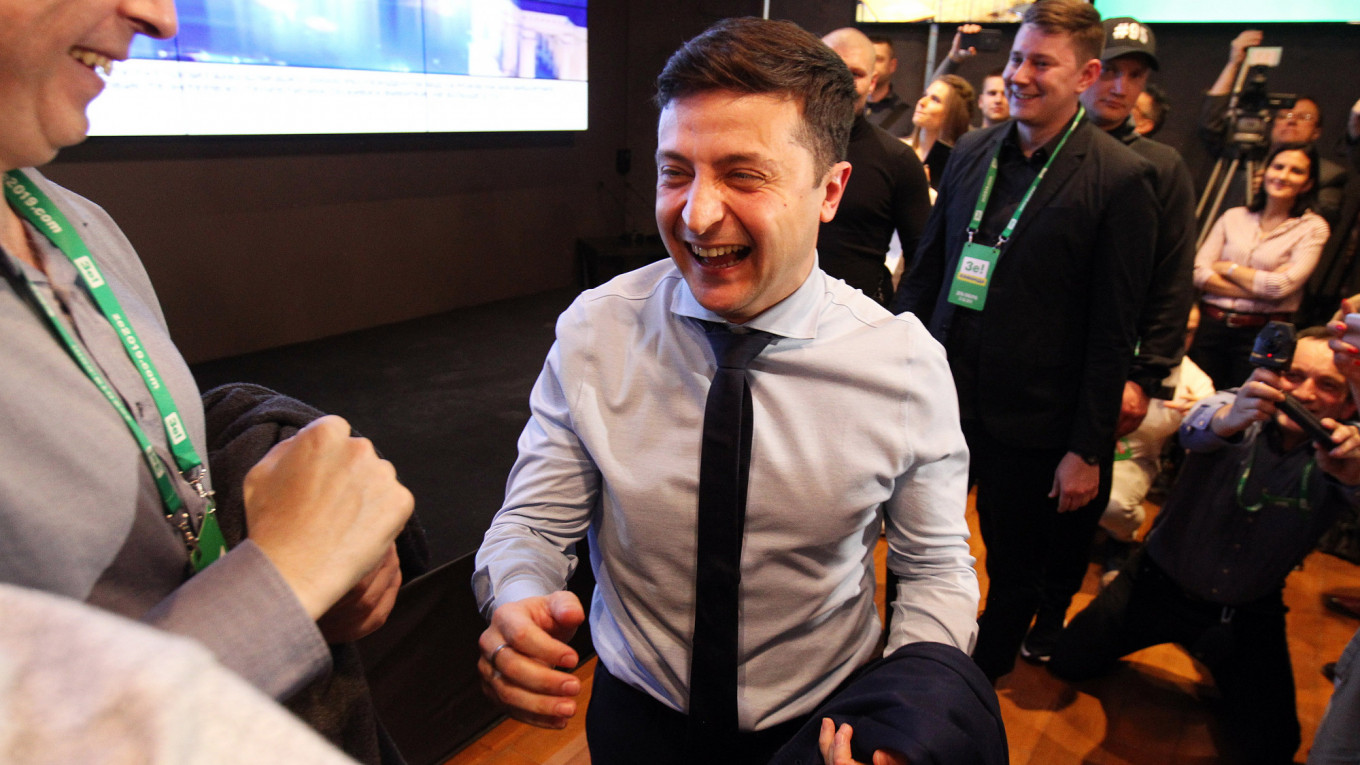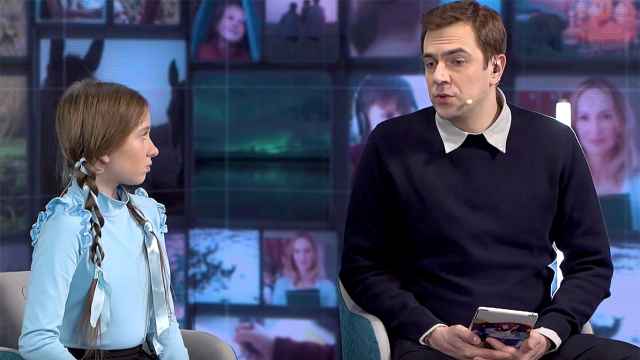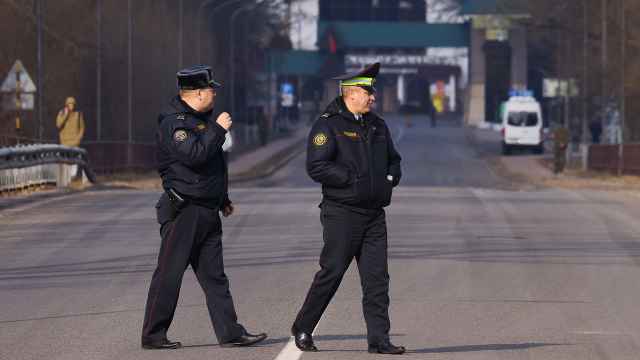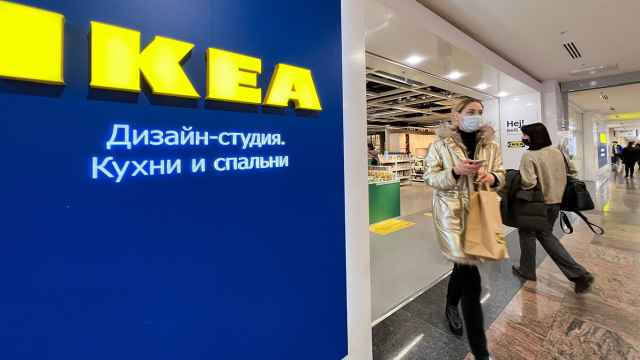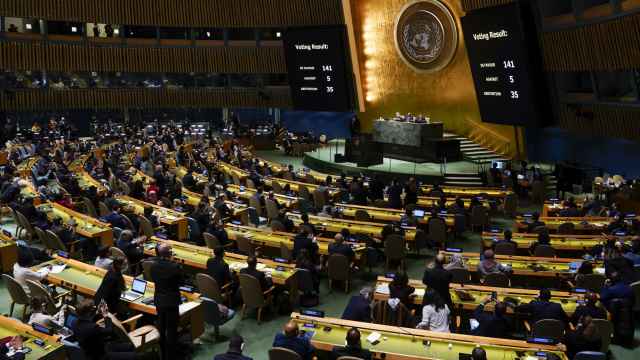A comedian with a popular anti-corruption message but no political experience took the lead in the first round of Ukraine's presidential election on Sunday, early exit polls showed.
Volodymyr Zelenskiy, 41, who plays a fictional president in a popular TV show, has consistently led opinion polls in a three-horse race against incumbent Petro Poroshenko and former Prime Minister Yulia Tymoshenko.
According to a preliminary exit poll based on votes deposited by 6:00 p.m., two hours before voting closed, Zelenskiy had secured 30.4 percent of votes compared to Poroshenko's 17.8 percent.
Tymoshenko, who had won 14.2 percent, immediately challenged the accuracy of the result, saying her internal polling put her in second place behind Zelenskiy. She said at a press conference that she might contest the final result.
At stake is the leadership of a country on the front line of the West's standoff with Russia after the 2014 Maidan street protests ejected Poroshenko's Kremlin-friendly predecessor and Russia annexed the Crimean peninsula.
No candidate is expected to receive more than half the votes, meaning the election would go to a runoff on April 21. Out of a crowded field of 39 candidates, none of the likely winners wants to move Ukraine back into Russia's orbit.
Investors are watching to see if the next president will push reforms required to keep the country in an International Monetary Fund bailout program that has supported Ukraine through war, sharp recession and a currency plunge.
"A new life is beginning, a normal life, a life without corruption, without bribes — life in a new country, the country of our dreams," Zelenskiy said after casting his vote earlier in the day.
Poroshenko has fought to integrate the country with the European Union and NATO, while strengthening the military which is fighting Kremlin-backed separatists in the east of the country.
After voting alongside his family the incumbent spoke about how a fair vote was essential for Ukraine's progress.
"This is an absolutely necessary condition for our moving forward, for the return of Ukraine into the family of European nations and our membership of the European Union and NATO," Poroshenko said.
Voting around the country offered a snapshot of Ukraine's recent history. Soldiers lined up to vote in makeshift polling stations in the east.
Voters formed long lines outside polling stations in neighboring EU member Poland, where between one and two million Ukrainians emigrated, many in search of jobs and higher wages.
Poroshenko called the election "a crossing of the Rubicon of not returning either to the Soviet Union or to the Russian empire."
Pushing the use of the Ukrainian language and instrumental in establishing a new independent Orthodox church, the 53-year-old confectionary magnate has cast himself as the man to prevent Ukraine again becoming a Russian vassal state.
But reforms crucial to keep foreign aid flowing have been patchy. Conflict in the eastern Donbass region has killed 13,000 people in five years and rumbles on despite Poroshenko's promise to end it within weeks. Frustration over low living standards and pervasive corruption has left the door open for Zelenskiy.
The majority of voters in separatist-held eastern Ukraine and Crimea were unlikely to take part in the election as they need to undergo a special registration process on Ukraine-controlled territory.
But Crimean residents who kept their Ukrainian citizenship after the Russian annexation five years ago crossed the land border to mainland Ukraine, from where buses took them to the nearest polling stations.
Anti-establishment
Just 9 percent of Ukrainians have confidence in their national government, the lowest of any electorate in the world, a Gallup poll published in March showed.
Zelenskiy has tapped into this anti-establishment mood, though his inexperience makes Western officials and foreign investors wary and sceptics question his fitness to be a wartime commander-in-chief.
Inviting comparisons with U.S. President Donald Trump and Italy's Five-Star movement, his campaign has relied heavily on social media and comedy gigs of jokes, sketches and song-and-dance routines that poke fun at his political rivals.
"He embodies the perceived need for 'new faces' in politics and could sway the young, pro-reform electorate to his side," said Economist Intelligence Unit analyst Agnese Ortolani.
Zelenskiy's campaign blurred the line between reality and the TV series in which he plays a scrupulously honest history teacher who accidentally becomes president.
In series three, which began airing in March, his character is flung into prison and the country falls under the control of oligarchs, populists and ultranationalists, and eventually gets broken up into 28 states. Thinly disguised characters resembling Poroshenko and Tymoshenko come to power.
Zelenskiy, who predominantly speaks Russian, may see his chances supported by a stronger turnout in the Russian-speaking east of the country.
The election campaign has been marred by allegations of fraud and vote-buying, meaning one or more of the candidates could contest the result.
But the voting day itself appeared to go quite smoothly. Police had received 1,360 complaints of electoral fraud by 1700, with the majority concerning illegal campaigning, but the violations were minor.
A Message from The Moscow Times:
Dear readers,
We are facing unprecedented challenges. Russia's Prosecutor General's Office has designated The Moscow Times as an "undesirable" organization, criminalizing our work and putting our staff at risk of prosecution. This follows our earlier unjust labeling as a "foreign agent."
These actions are direct attempts to silence independent journalism in Russia. The authorities claim our work "discredits the decisions of the Russian leadership." We see things differently: we strive to provide accurate, unbiased reporting on Russia.
We, the journalists of The Moscow Times, refuse to be silenced. But to continue our work, we need your help.
Your support, no matter how small, makes a world of difference. If you can, please support us monthly starting from just $2. It's quick to set up, and every contribution makes a significant impact.
By supporting The Moscow Times, you're defending open, independent journalism in the face of repression. Thank you for standing with us.
Remind me later.


